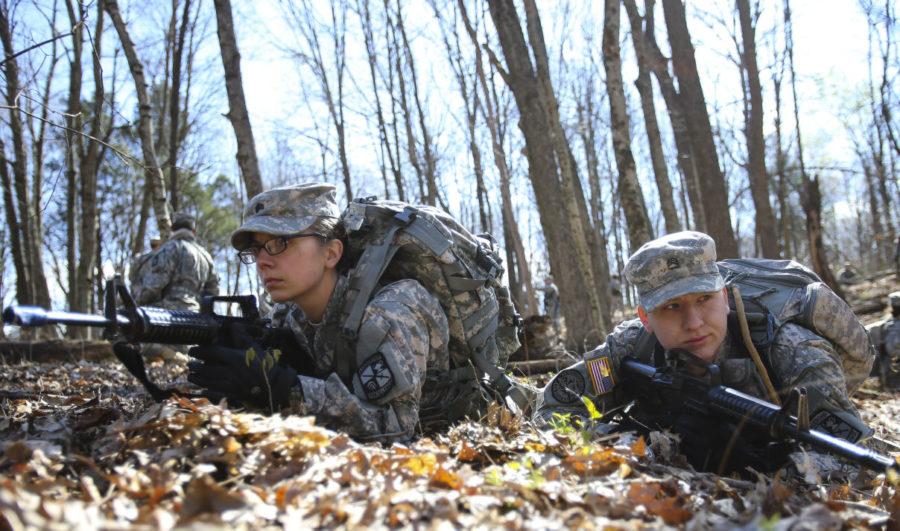Long days, big smiles at Army ROTC training weekend
April 8, 2016
On Saturday afternoon, just before a group of about 20 cadets reached the village they were marching toward, an ambush struck.
“Bang! Bang, bang! Bang, bang, bang!” rang out from the woods on their left. Two of the group’s soldiers fell dead, and one was wounded.
The wounded soldier screamed for help, calling for a medic. “I’m dying, please help, please,” he screamed.
The soldier’s calls were a glimpse of the reality the cadets may face after they graduate from UK as Army officers.
For many of the cadets, the lessons they learned last weekend at Fort Knox during the UK Army ROTC’s annual training weekend could one day determine whether they live or die, but that did not stop them from having fun.
When medics finally did come for their fallen comrade, the wounded student couldn’t help but smile as they dragged him to cover and pretended to save his life. The weekend consisted of a series of different training exercises, from obstacle courses to making deals with fake villagers. Different exercises served different purposes: obstacle courses boosted their confidence, tactical operations fine-tuned their understanding of troop formations, and interactions with mock villages taught them how to win over the hearts and minds of locals.
On Saturday, the mission was to find members of the South Atropian People’s Army, commonly referred to as SAPA, a fictitious terrorist group in the land of Atropia. ROTC units around the country use SAPA as their mock terrorist cell.
Units of cadets made their way to a fake village where they would find some of their more senior peers playing the roles of fake villagers. There was a village leader, a trader, a doctor and so on.
As it turned out, the doctor was a member of SAPA, but it took a couple of meetings with the villagers before the cadets were able to figure that out.
Some meetings were rockier than others. At one point, the trader managed to walk off with one of the troop’s guns and one of their rucksacks.
This, obviously, was a big blunder when it came to interacting with locals.
But the cadets learned and improved, at least in some ways, every time they returned to the village and had to interact with locals.
“There’s nothing I can see more important than negotiating skills,” Lt. Col. Thomas Krupp said of the current state of the U.S. military.
The ROTC has recently put much more of an emphasis on how soldiers should interact and negotiate with locals, Krupp said, because in Afghanistan and Iraq, soldiers need the help of locals to accomplish their missions.
Winning hearts and minds is vital to the nation’s military success abroad, and because troops are the face of the U.S. to much of the world, the Army has made it a crucial part of their mission to train soldiers on how to do that.
But to get to the villages where the locals live, soldiers must know the fundamentals of troop formation and how to respond to incoming fire.
In the first ambush, 2nd Lt. Jonathan Strickland, who was helping instruct the cadets, said they responded poorly.
The cadets did not communicate, and thus became easy targets for the enemy SAPA forces.
“It’s all about attention to detail — that’s everything,” said Christian Vara, a business management senior and ROTC cadet. “Not paying attention to little stuff is what gets you killed.”
On the second round of ambush training, the cadets were noticeably sharper, yelling commands clearly and communicating among themselves which lines of troops were moving up, and who was providing supporting fire.
The training weekend provided the cadets — some of whom will go on to be the face of the nation in foreign countries — the fundamentals that could save their lives, and the skills to work well with the locals they meet.
































































































































































